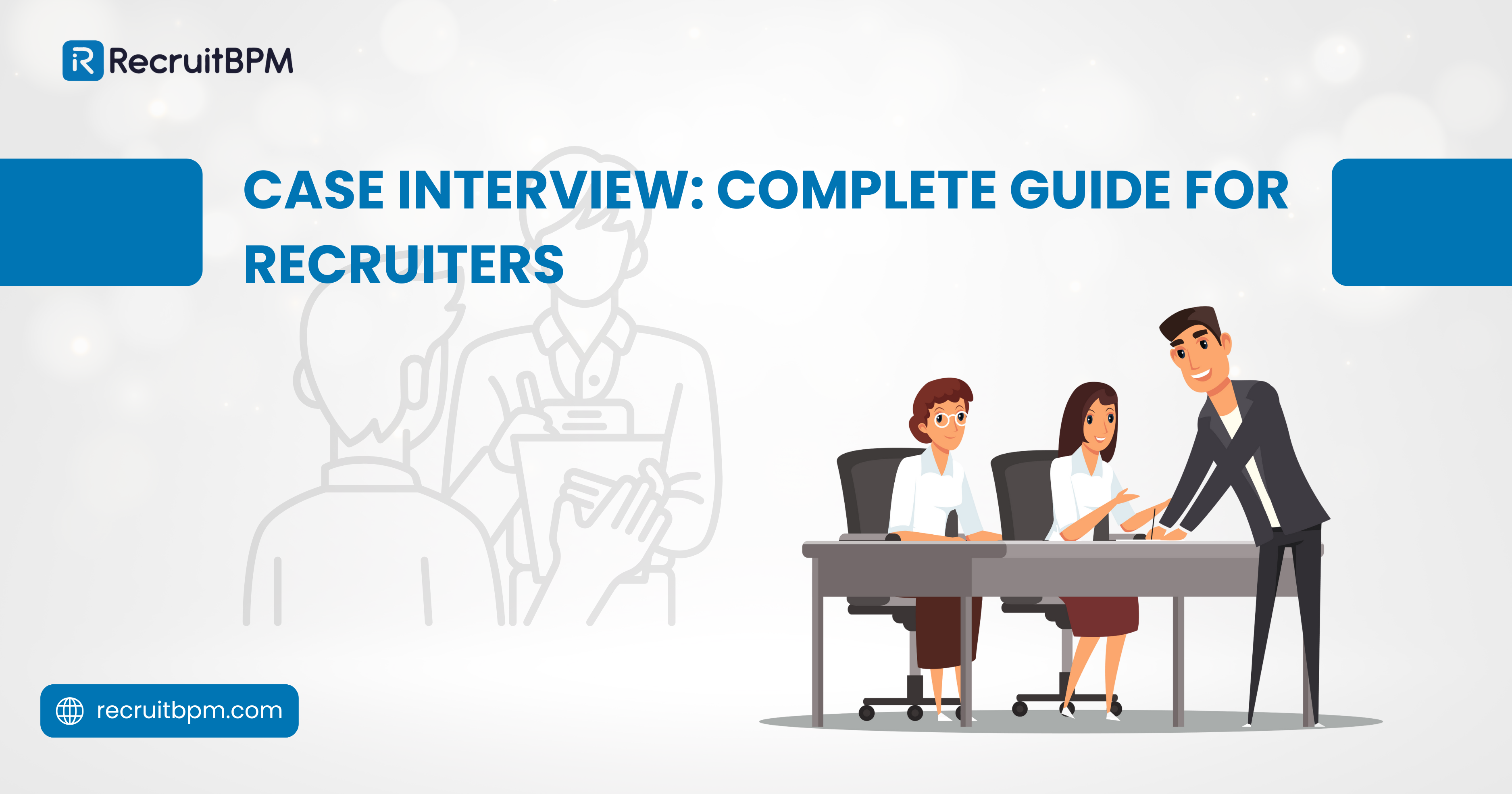A case interview is a structured assessment method where candidates solve real-world business problems. Recruiters present scenarios requiring analytical thinking, problem-solving skills, and strategic reasoning. This evaluation format originated in management consulting firms.
Why Recruiters Use Case Interviews?
Case interviews reveal how candidates think under pressure. They demonstrate problem-solving approaches, communication skills, and business acumen. Unlike traditional interviews, they show actual capabilities rather than rehearsed answers.
This method works exceptionally well for consulting, strategy, and analytical roles. Recruiters gain insight into decision-making processes and logical reasoning abilities.
Types of Case Interviews
Market Sizing Cases
Candidates estimate market size or demand for products. These tests quantitative reasoning and logical approximation skills. Example: “How many coffee shops operate in New York City?”
Profitability Cases
These examine why profits decline or how to improve them. Candidates analyze revenue streams and cost structures. They requirean understanding of business fundamentals and financial metrics.
Growth Strategy Cases
Candidates develop expansion plans for companies. These assess strategic thinking and market analysis capabilities. Example: “Should this retailer enter the Asian market?”
Operations Cases
These focus on improving efficiency and processes. Candidates identify bottlenecks and recommend solutions. They test practical problem-solving and systems thinking.
How to Conduct Effective Case Interviews?
Preparation Phase
Select cases relevant to your industry and role requirements. Prepare evaluation rubrics focusing on analytical skills, structured thinking, and communication. Ensure consistency across all candidates.
During the Interview
Present the case clearly with the necessary context. Allow candidates time to ask clarifying questions. Observe their approach to structuring problems and breaking them into manageable parts.
Listen for logical reasoning rather than perfect answers. The process matters more than the conclusion. Take notes on communication style and confidence level.
Evaluation Criteria
Assess problem structuring ability and analytical rigor. Evaluate communication clarity and confidence. Consider creativity in approaching challenges and the practical feasibility of recommendations.
Look for candidates who ask insightful questions. Strong performers demonstrate business intuition and adaptability when given new information.
Common Case Interview Frameworks
SWOT Analysis
Examines Strengths, Weaknesses, Opportunities, and Threats. Useful for strategic assessment cases. Helps candidates organize their thinking systematically.
Porter’s Five Forces
Analyzes competitive dynamics within industries. Evaluates supplier power, buyer power, competitive rivalry, substitution threats, and entry barriers.
Profitability Framework
Breaks down into Revenue and Costs. Revenue splits into Price and Quantity. Costs are divided into fixed and Variable expenses.
4 P’s of Marketing
Covers Product, Price, Place, and Promotion decisions. Helpful for marketing strategy cases and product launch scenarios.
Best Practices for Recruiters
Start with simpler cases to reduce candidate anxiety. Provide hints when candidates struggle significantly. Create a collaborative rather than combative atmosphere.
Allow 30-45 minutes for comprehensive cases. Shorter cases work for initial screening rounds. Longer cases suit the final interview stages.
Document your observations immediately after interviews. Compare candidates using standardized criteria. Avoid bias by focusing on demonstrated skills rather than personality fit.
Preparing Candidates for Success
Share case interview expectations during scheduling. Provide sample frameworks or recommended resources. This transparency improves candidate experience and attracts top talent.
Consider offering practice cases for internal candidates. This investment demonstrates a commitment to employee development. It also improves overall interview performance quality.
Common Mistakes to Avoid
Don’t create unnecessarily complex scenarios. Avoid cases requiring specialized knowledge that candidates shouldn’t have. Never interrupt candidates mid-analysis without a good reason.
Refrain from poker-faced interviewing styles. Provide appropriate feedback cues and engagement. Remember you’re assessing capability, not creating stress tests.
Don’t rely solely on case interviews. Combine them with behavioral questions and technical assessments. This comprehensive approach provides fuller candidate evaluation.
Integration with ATS Systems
Modern applicant tracking systems streamline case interview management. Schedule interviews, share materials, and collect feedback through centralized platforms. Track candidate performance across multiple evaluation dimensions.
Use workflow automation to send case materials and preparation guides. Document interview outcomes consistently for better hiring decisions. Analytics help identify which case types predict success.
Measuring Case Interview Effectiveness
Track correlation between case performance and job success. Survey hiring managers about new hire performance. Analyze which cases best predict role-specific capabilities.
Monitor candidate feedback about the interview experience. High-quality processes attract better talent. Continuous improvement ensures your assessment methods remain effective.
Future of Case Interviews
Virtual case interviews expand geographic reach. Digital collaboration tools simulate real work environments. Video platforms enable remote assessment without location constraints.
AI-assisted evaluation provides consistency in scoring. However, human judgment remains essential for nuanced assessment. Technology enhances rather than replaces recruiter expertise.
Key Takeaways
Case interviews reveal problem-solving abilities effectively. They require careful design and skilled facilitation. When executed well, they significantly improve hiring quality.
Balance structure with flexibility during assessment. Create positive candidate experiences while maintaining rigor. Use technology to enhance efficiency without sacrificing personal connection.
Continuous refinement ensures your case interviews remain relevant. Regular training keeps interviewers sharp and consistent. This investment pays dividends through better talent acquisition outcomes.

















